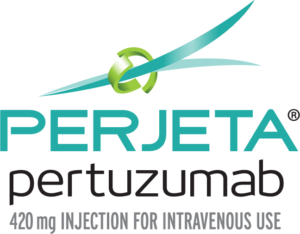
Perjeta is a medicine that targets the HER2 receptor, a protein found on the outside of many normal cells and in high quantities on the outside of cancer cells in HER2-positive cancers. Perjeta is designed specifically to prevent the HER2 receptor from pairing (or ‘dimerizing’) with other HER receptors (EGFR/HER1, HER3 and HER4) on the surface of cells, a process that is believed to play a role in tumor growth and survival. Binding of Perjeta to HER2 may also signal the body’s immune system to destroy the cancer cells. The mechanisms of action of Perjeta and Herceptin are believed to complement each other, as both bind to the HER2 receptor, but to different places. The combination of Perjeta and Herceptin is thought to provide a more comprehensive, dual blockade of HER signaling pathways, thus preventing tumor cell growth and survival.
Breast cancer is a malignant tumor that originates in the cells of the breast, commonly affecting the ducts and lobules. It is the most common cancer among women worldwide, though it can also occur in men. The development of breast cancer involves the abnormal growth of breast cells that can invade surrounding tissues and spread to other parts of the body (metastasize). Risk factors include genetic mutations (such as BRCA1 and BRCA2), family history of breast cancer, hormonal influences, and certain lifestyle factors such as alcohol consumption and obesity.
Early detection through screening methods like mammography, breast self-examinations, and clinical breast exams is crucial for effective treatment and improved survival rates. Treatment options vary based on the stage and subtype of breast cancer and may include surgery, radiation therapy, chemotherapy, hormone therapy, and targeted therapy. Advancements in personalized medicine and ongoing research continue to enhance the understanding and management of breast cancer, leading to more tailored and effective treatment approaches.
Companion diagnostic testing plays a significant role in the decision to treat breast cancer with Perjeta (pertuzumab). This treatment is typically used in combination with Herceptin (trastuzumab) and chemotherapy for treating HER2-positive breast cancer. HER2, or human epidermal growth factor receptor 2, is a protein that can promote the growth of cancer cells. In about 20% of breast cancers, an excessive amount of the HER2 protein is made due to a gene mutation.
Before starting treatment with Perjeta, patients undergo diagnostic testing to determine if their cancer is HER2-positive. This is crucial because Perjeta specifically targets the HER2 protein and is only effective in cancers that overexpress this protein. The companion diagnostic tests, such as immunohistochemistry (IHC) and fluorescence in situ hybridization (FISH), are used to assess the HER2 levels in the tumor tissue, ensuring that Perjeta is prescribed to patients who are most likely to benefit from this targeted therapy. This precision in treatment helps improve outcomes and avoids unnecessary side effects for patients unlikely to benefit from the therapy.

Place a test order through your EMR system if enabled or order online by logging in or signing-up for a Foundation Medicine account. Orders can also be submitted via email or fax using our Test Requisition Form.

This companion diagnostic was developed by an IVD manufacturer as a kit. This is a valid FDA approved test if utilized by 3rd party diagnostic labs who have validated the test using the kit on the specified platform. It is not directly orderable from the manufacturer.

This companion diagnostic was developed by an IVD manufacturer as a kit. This is a valid FDA approved test if utilized by 3rd party diagnostic labs who have validated the test using the kit on the specified platform. It is not directly orderable from the manufacturer.
Perjeta (pertuzumab) is a targeted therapy used to treat HER2-positive breast cancer. It is often used in combination with Herceptin (trastuzumab) and chemotherapy. Perjeta targets the HER2 protein, which is overexpressed in some breast cancer cells, helping to inhibit the growth of these cancer cells.
Perjeta is recommended for patients with HER2-positive breast cancer, which is determined by companion diagnostic tests. It is used for both early-stage and metastatic settings, depending on the specific characteristics and progression of the cancer.
Clinical studies have shown that Perjeta, when used in combination with Herceptin and chemotherapy, can significantly improve survival rates and reduce the risk of cancer recurrence in patients with HER2-positive breast cancer. This combination is particularly effective in early-stage breast cancer and for patients with metastatic cancer.
Common side effects of Perjeta include diarrhea, hair loss, nausea, fatigue, and rash. More severe side effects can include heart problems and infusion-related reactions. Patients are monitored closely for any signs of these serious side effects throughout the treatment.
Perjeta is administered through an intravenous (IV) infusion. The initial dose is typically given over a 60-minute period, followed by maintenance doses that may be administered over 30 to 60 minutes every three weeks, as part of a combination regimen with other therapies.
Before starting treatment with Perjeta, patients undergo diagnostic testing to confirm their HER2 status. Tests such as immunohistochemistry (IHC) or fluorescence in situ hybridization (FISH) determine if the cancer is HER2-positive and thus likely to respond to Perjeta. This ensures the drug is used effectively, targeting patients who are most likely to benefit from its mechanism of action.

Founded more than 40 years ago, Genentech is a leading biotechnology company that discovers, develops, manufactures and commercializes medicines to treat patients with serious and life-threatening medical conditions. The company, a member of the Roche Group, has headquarters in South San Francisco, California. For additional information about the company, please visit http://www.gene.com.